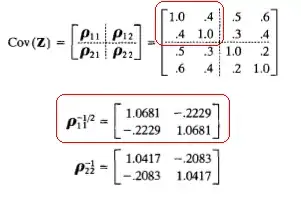I know what is inverse (-1) of a matrix but I do not have any idea how to compute this P^{-1/2}.

I know what is inverse (-1) of a matrix but I do not have any idea how to compute this P^{-1/2}.

To quote from this Wikipedia article, for a $2x2$ matrix $M$ with $$ M = \left( \begin{array}{cc} A & B \\ C & D \end{array}\right) $$ one defines $$ \tau = \mbox{tr} \, M = A + D, \quad \delta = \mbox{det} \, M = AD - BC $$ and $$ s = \pm \sqrt{\delta}, \quad t = \pm \sqrt{\tau + 2 s} $$
Which for $t \ne 0$ yields $$ M^{1/2} = \frac{1}{t} \left( \begin{array}{cc} A + s & B \\ C & D + s \end{array} \right) $$
The inverse of a $2x2$ matrix using the above definitions for $M$ and $\delta$ is
$$ M^{-1} = \frac{1}{\delta} \left( \begin{array}{cc} D & -B \\ -C & A & \end{array} \right) $$
$$ M^{-1/2} = (M^{-1})^{1/2} = (M^{1/2})^{-1} $$
Using the latter one we get
$$ M^{-1/2} = \frac{1}{\delta'} \left( \begin{array}{cc} D' & -B' \\ -C' & A' & \end{array} \right) = \frac{1}{\delta' t} \left( \begin{array}{cc} D + s & -B \\ -C & A + s & \end{array} \right) $$ with $\delta' = ((A+s)(D+s) - BC) / t^2$.
$$ A = 1, \quad B = 0.4, \quad C = 0.4, \quad D = 1 $$
we get (rounded to 5 digits) for the matrix roots:
$$ \tau = 2, \quad \delta = 0.84 \\ s = \pm 0.91652, \quad t \in \{\pm 1.9578, \pm 0.40862 \} \\ M^{1/2} \in \left\{ \pm \left( \begin{array}{cc} 0.97891 & 0.20431 \\ 0.20431 & 0.97891 \end{array} \right), \pm \left( \begin{array}{cc} 0.20431 & 0.97891 \\ 0.97891 & 0.20431 \end{array} \right) \right\} $$
and for the inverse matrix roots:
$$ \delta' \in \{ 0.91652, -0.91652 \} \\ M^{-1/2} \in \left\{ \pm\left( \begin{array}{cc} 1.06807 & -0.22292 \\ -0.22292 & 1.06807 \end{array} \right), \pm\left( \begin{array}{cc} -0.22292 & 1.06807 \\ 1.06807 & -0.22292 \end{array} \right) \right\} $$
That first positive one is the one from your example. Testing a bit:
$$ (M_1^{-1/2})^2 = \left( \begin{array}{cc} 1.06807 & -0.22292 \\ -0.22292 & 1.06807 \end{array} \right)^2 = \left( \begin{array}{cc} 1.19048 & -0.47619 \\ -0.47619 & 1.19048 \end{array} \right) \\ M^{-1} = \left( \begin{array}{cc} 1.19048 & -0.47619 \\ -0.47619 & 1.19048 \end{array} \right) $$ which seems fine.